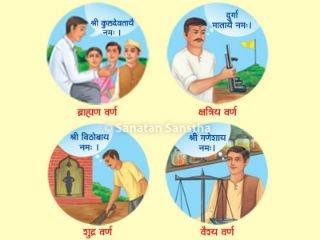The social system created to assist every individual in the society for him to behave as per his basic temperament, that is, according to his basic nature based on the trigunas (Sattva, Raja and Tama) and to bring about his spiritual progress is termed as Chaturvarna (The system of four classes). In other words, Chaturvarna has been created to guide on how to behave, what sadhana (Spiritual practice) should one perform as per one’s qualifications, that is, potential and requirement so as to obtain Anand (Bliss).

1. Objective (Principle) and importance
A. The creation of the varna described by authors of the Smrutis (Compilation of traditions in Hindu Dharma) is based on division of labour. They were meant to bring about co-ordination between various social groups without leading to any rift between them. In that Varnavyavastha, rather than the rights and privileges of the different varnas, emphasis was laid on performing duties.
B. Shrikrushna has said (Shrimadbagwadgita, Adhyaya 4, Shloka 13) ‘चातुर्वर्ण्यं मया सृष्ट्यं गुणकर्मविभागशः ।’, which means, ‘I have divided Chaturvarna according to the gunas (Qualities) predominant in each and have allotted corresponding duties to them’.
C. Each is born in a particular varna depending on his potential to practise Spirituality or according to his need for that specific sadhana. God’s objective in establishing this system of Chaturvarna was for man to re-enter the Hansa varna after he fulfils the obligations of all the Chaturvarna. This means, that the restrictions of the Chaturvarna imposed by God are in fact meant to destroy the Chaturvarna. The same point has been emphasized in Shri Eknathi Bhagwat.
D. Every individual at the time of birth is a Shudra. (जननात् जायते शूद्रः।) With his actions (meaning sadhana) if he becomes Vaishya, Kshatriya and Brahman, then his purpose of life is fulfilled.
E. ‘God has created Chaturvarna so that the society remains Sattva-predominant, which is useful for protecting the Nation. This will help in developing mutual love. The purpose in this is, that of the happy and the unhappy, those who are unhappy are able to endure unhappiness on the strength of mutual love. Though happiness and unhappiness are related to the karmas (Acts or actions that give rise to destiny), love is not bound by karma. Love is a steady emotion of the mind. This steady emotion and Dharma are one and the same. The meaning of Dharma is conduct.’
– H.H. Kane Maharaj, Narayangaon, District Pune, Maharashtra
2. Superiority of an individual as per his gunas and karmas
‘न जात्या ब्राह्मणश्चास्मि क्षत्रियो वैश्य एव वा ।
न शूद्रो नच वा म्लेंच्छो भेदा एते गुणकर्मभिः ।।
Meaning : An individual does not become Brahman, Kshatriya, Vaishya, Shudra or Malechha according to birth, but as per his gunas and karmas.
‘In Hindu Dharma, the concept of upper caste and lower caste was not prevalent at all. The kind of karmas were given importance. Almost 30% Holy texts of Hindus, for example, the Ramayan, Mahabharat, Gita have been written by great authors who were neither Brahmans nor from the upper class. Upon reading the biographies of some Sages and Seers, we can conclude that an individual is considered great due to his karmas and not due to his birth. This will be clear from the examples of some Sages and Seers as provided ahead.
Kaivart : Sage Vyas was born from a woman belonging to Koli caste.
Shwapak : Sage Parashar was born from a woman belonging to Chanḍal caste.
Shuki : Sage Kanad was born from a woman belonging to Shudra caste.
Doe : Sage Krushyashrunga was born of a doe.
Apsara : Sage Vasishṭha was born of an Apsara.
Manḍuki (Frog) : Sage Manḍavya was born of a Manḍuki.
Lavik (Lava bird) : Sage Mandapal was born of a lava bird
The Garbhadan sanskar of all the above-mentioned Sages was not performed. No other sanskar was performed on them. They did not belong to a high gotra or lineage. Only due to their qualities, karmas, education, association with Saints and sadhana, they became great Sages.’

 Serving a guest is the chief Dharma of Gruhasthashram
Serving a guest is the chief Dharma of Gruhasthashram What is the objective of Ashramvyavastha?
What is the objective of Ashramvyavastha? Why is Shudra varna considered to be the supreme one?
Why is Shudra varna considered to be the supreme one? What bhav should one possess while giving an offering?
What bhav should one possess while giving an offering? Awakening of Dharma in the Nation – superiormost duty of Brahman varna
Awakening of Dharma in the Nation – superiormost duty of Brahman varna Importance of abiding to conduct as per Chaturvarna in Kaliyug
Importance of abiding to conduct as per Chaturvarna in Kaliyug